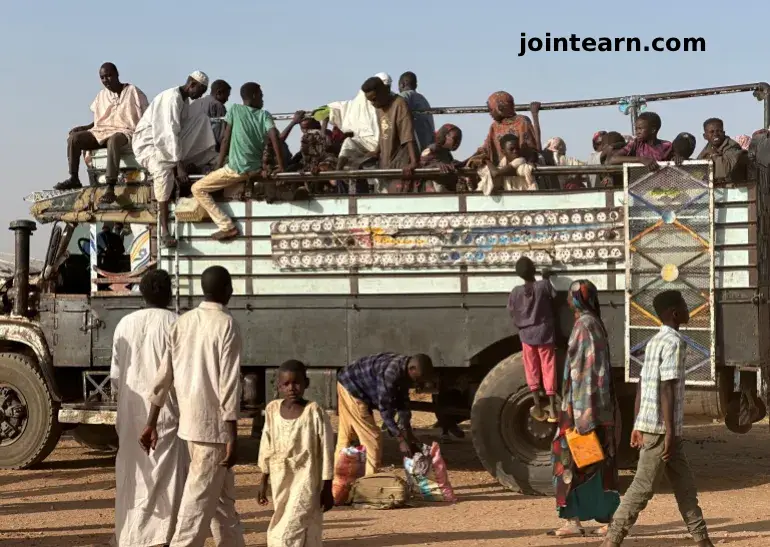
Tawila, North Darfur — As the paramilitary Rapid Support Forces (RSF) declared full control over el-Fasher, the capital of North Darfur, stories of desperation, violence, and resilience began to emerge from those who managed to flee the besieged city.
For Mouawia, a 31-year-old civilian activist and volunteer medic, escaping el-Fasher was a painful decision born out of exhaustion, injury, and the collapse of hope. “It feels like we’ve lost everything,” he said, speaking softly from Tawila, a small town roughly 60 kilometers away. “I keep thinking about the people still trapped — the children, the families — and I can’t stop worrying.”
El-Fasher Falls After Two Years of Siege
After more than two and a half years of war between Sudan’s army and the RSF, the paramilitary group claimed victory on Sunday, announcing it had captured the Sixth Armoured Division, the army’s last major garrison in el-Fasher.
For 18 months, RSF forces encircled the city, cutting off aid, attacking civilians, and deliberately engineering famine conditions. Humanitarian agencies describe the situation as one of the worst man-made crises in Darfur’s history, with thousands of civilians dead and countless more displaced.
The Escape: A Dangerous Path Through RSF Checkpoints
In early October, with bombardments intensifying, Mouawia decided to flee. His departure marked the end of his volunteer work in a makeshift clinic that had been serving his western neighborhood for nearly two years.
Earlier, a shell explosion had thrown him to the ground, embedding shrapnel in his stomach — an injury that doctors in el-Fasher’s overwhelmed hospitals could not fully treat.
When the RSF announced a “safe corridor” for civilians, he seized the chance to escape. But as he soon discovered, safety was an illusion.
“We left quietly, praying to reach somewhere safe,” he recalled.
The road out of el-Fasher wound northwest instead of southwest — the RSF had constructed massive sand berms blocking most routes. As he and a fellow volunteer reached the outskirts of Garni, RSF fighters stopped them, accusing them of being soldiers disguised as civilians.
They were beaten, humiliated, and robbed of their cash and phones. When one soldier found freshly printed government currency, he snarled: “This is flangi money!” — a slur used to accuse someone of supporting the army.
“Eat it,” the soldier ordered, forcing Mouawia to swallow the bills before slapping him across the face.
Ransom and Extortion on the Road
Their ordeal didn’t end there. At another checkpoint, fighters demanded 10 billion Sudanese pounds ($3,500) in ransom — an impossible sum. After negotiations, the demand was lowered to 2.5 billion pounds ($860).
With his life hanging in the balance, Mouawia called friends in Khartoum and fellow volunteers, who scraped together enough money to transfer the ransom through an RSF-controlled Starlink station.
“We paid just to survive,” he said.
Even after paying, the fighters mocked them, offering a WhatsApp number “for protection” before driving away.
On the road between Garni and Jughmer, they encountered yet more RSF units demanding “transport fees” from desperate civilians. In one camp, women and children were detained until payments were made. “They said it was for transport, but it was ransom by another name,” Mouawia said.
Eventually, a sympathetic driver agreed to take them to Tawila for 130,000 pounds ($0.04). “After everything, I just thanked God we made it alive,” he said.
‘Everything Stopped’: Life Under Siege in El-Fasher
Before the city fell, life in el-Fasher had already ground to a halt. When fighting broke out in April 2023, hospitals shut down, food ran out, and families were trapped under near-constant shelling.
Mouawia, a media graduate, joined a group of local youth — doctors, engineers, and students — to reopen a community clinic using local donations. They treated the wounded, delivered babies, and fed displaced families.
“We worked together regardless of our beliefs or politics,” he said. “It was the only thing keeping hope alive.”
By late 2024, as RSF forces tightened their siege, the volunteers shifted to house-to-house food deliveries, braving drone strikes and sniper fire. “The food we cooked for displaced families became our only meal of the day,” he said.
When RSF troops began targeting community kitchens and aid centers in early 2025, many volunteers fled or were killed. Those who stayed, like Mouawia, faced starvation and the constant fear of being branded army collaborators.
“We held on as long as we could,” he said. “But in the end, leaving was the only way to survive.”
Tawila: A Fragile Refuge
Now in Tawila, Mouawia is among thousands of displaced civilians living in makeshift shelters. Many, like him, bear physical and emotional scars from their journey.
International aid groups have struggled to reach the area due to RSF checkpoints and continued fighting. Food prices have soared, and disease outbreaks are spreading through crowded camps.
Still, Mouawia refuses to abandon hope entirely. “When we were helping people in el-Fasher, we believed that even a little act of kindness could keep hope alive,” he said. “That’s what I’m trying to hold onto.”


Leave a Reply